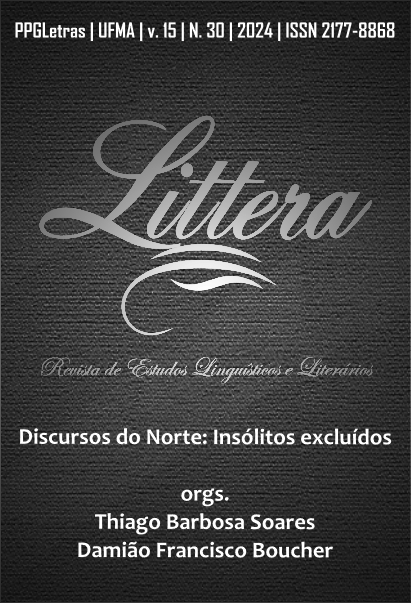Desqualificação do outro e mobilizações intertextuais em interações polêmicas sobre o Projeto de Lei (PL) 580/ 2007
DOI :
https://doi.org/10.18764/2177-8868v15n30.2024.20Mots-clés :
Argumentação, Intertextualidade, PolêmicaRésumé
A expansão das redes sociais e as discussões que nela se desdobram advindas de temas da esfera social, intensificaram o fluxo de discursos que se entrecruzam nessas redes antagonicamente. Desse modo, esta pesquisa tem como objetivo analisar a partir das interações polêmicas sobre o PL 508/ 2007, o modo que os processos intertextuais são mobilizados em interações polêmicas com o objetivo de desqualificar o outro. Fundamentamo-nos nos estudos sobre a polêmica pública (AMOSSY, 2017), classificação do argumento ad hominem (FIORIN, 2015), interface entre Linguística Textual e a Teoria da Argumentação no Discurso (CAVALCANTE et al. 2020) e a intertextualidade no que diz respeito aos processos intertextuais estritos e amplos (CARVALHO, 2018). Para a análise dos dados, selecionamos uma publicação do perfil @ivetesangalo, em que a cantora se posiciona sobre o projeto de lei (PL) 580/2007, desta publicação, analisaremos interações polêmicas realizadas nos comentários da postagem. A análise permitiu constatar que a intertextualidade é mobilizada nas interações polêmicas com a intenção de desqualificar o outro e prosseguir vinculando-se a novas ideias e propagando-se nos ambientes virtuais, com a proposta argumentativa de defender o ponto de vista do locutor.
Téléchargements
Références
ADAM, Jean-Michel. A linguística textual: introdução à análise textual dos discursos.
Tradução: João Gomes da Silva Neto et al. 2.ed. São Paulo: Cortez, 2011.
AMOSSY, R. A argumentação no discurso. Tradução Eduardo Piris et al. São Paulo: Contexto, 2018.
AMOSSY, R. Apologia da polêmica. Coordenação de tradução: Mônica Magalhães
Cavalcante; Tradução: Rosalice Botelho, Walkim Souza Pinto ... [et al.]. – São Paulo: Contexto, 2017.
AMOSSY, R. “As modalidades argumentativas do discurso”. In: LARA, Glaucia Muniz Proença; MACHADO, ida Lucia; EMEDIATO, Wander. (org). Análises do discurso hoje. Rio de Janeiro: Nova Fronteira, 2008, p. 233-237
AMOSSY, R. Argumentação e Análise do Discurso: perspectivas teóricas e recortes
disciplinares. Tradução Eduardo Lopes Piris, Moisés Olímpio Ferreira. EID&A – Revista Eletrônica de Estudos Integrados em Discurso e Argumentação, Ilhéus, n. 1, p. 129-144, jun./nov. 2011.
CARVALHO, Ana Paula Lima de. Sobre intertextualidades estritas e amplas. 2018. 136f. –Tese (Doutorado) - Universidade Federal do Ceará, Programa de Pós-graduação em Linguística, Fortaleza (CE), 2018.
CAVALCANTE, M.M. Abordagens da argumentação nos estudos de Linguística Textual. ReVEL, edição especial vol. 14, n. 12, 2016.
CAVALCANTE, Mônica Magalhães et alii. Linguística Textual e Argumentação. Campinas: Pontes editores, 2020.
CAVALCANTE, Mônica; PINTO, Rosalice; BRITO, Mariza. Polêmica e argumentação: interfaces possíveis em textos midiáticos de natureza política. Diacrítica, v. 32, n. 1, p. 5-24, 2018.
CAVALCANTE, Mônica Magalhães; BRITO, Mariza Angélica Paiva; CUSTÓDIO FILHO, Valdinar; CORTEZ, Suzana Leite; PINTO, Rosalice Botelho Wakim Souza; PINHEIRO, Clemílton Lopes. O texto e suas propriedades: definindo perspectivas para análise. Revista (Con)Textos Linguísticos, Vitória (ES), v. 13, n. 25, p. 25-39, 2019.
CUSTÓDIO FILHO, V.; CAVALCANTE, M. M. Ponto de Vista em Linguística Textual: Efeitos Argumentativos e Aplicações no Ensino de Língua Portuguesa. Revista Ensin@ UFMS, v. 4, n. 8, p. 379-403, 31 dez. 2023.
FIORIN, J. L. Argumentação. São Paulo: Contexto, 2015.
GENETTE, Gérard. Palimpsestos: a literatura de segunda mão. Tradução: Cibele Braga et al. 2.ed. Belo Horizonte: Edições Viva Voz, 2010.
MACEDO, P. S. A. Análise da argumentação no discurso: uma perspectiva textual. Tese (Tese de Doutorado). Universidade Federal do Ceará, Centro de Humanidades, Programa de Pós-Graduação em Linguística, Fortaleza, 2018.
Téléchargements
Publié-e
Comment citer
Numéro
Rubrique
Licence

Cette œuvre est sous licence Creative Commons Attribution - Pas d'Utilisation Commerciale - Pas de Modification 4.0 International.
Direitos autorais Littera on line
Este obra está licenciado com uma Licença Creative Commons Atribuição-NãoComercial-SemDerivações 4.0 Internacional.









